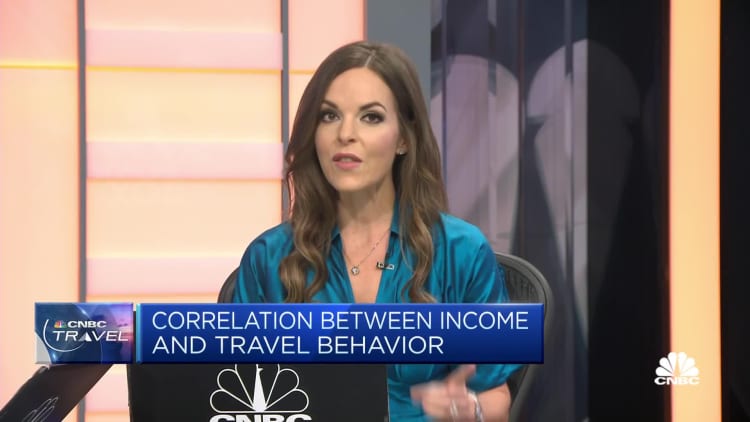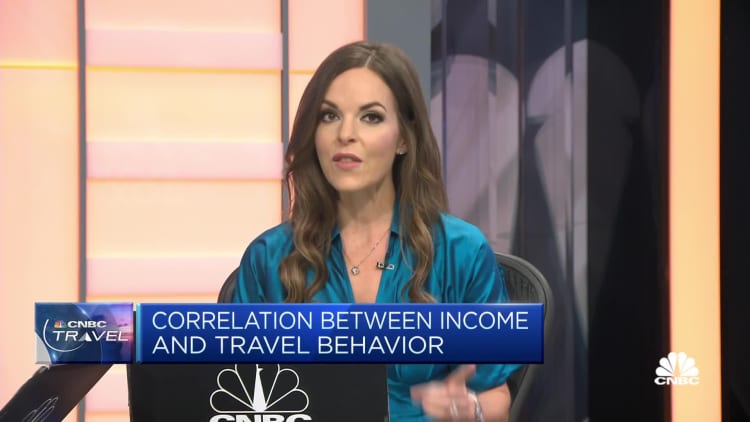D3sign | Moment | Getty Images
Some aspects of travel are pricier than ever amid pent-up demand.
“The big cities and the popular [international] destinations — Paris, Rome, Madrid, Lisbon, Milan — those are off the charts,” Sofia Markovich, a travel advisor and founder of Sofia’s Travel, said of trip cost. “I look at this every day and I’m just shaking my head, like wow.”
But fear not: There are ways for price-conscious travelers to satiate their wanderlust without breaking the bank.
“People should be prepared not just for a busy travel season, but an expensive travel season,” said Sally French, a travel expert at NerdWallet. “The good news is: There’s hope.”
Often, scoring the best deal may mean staying flexible and planning well ahead of time, experts said. Here’s what you need to know about the current market, and how to save.
More from Personal Finance:
This is the ‘best defense’ against inflation, says financial advisor
Egg prices crashed 11% in March — and more relief may follow
Here’s the inflation breakdown for March 2023 — in one chart
International travel costs have hit record highs
The Eiffel Tower and Seine River at sunrise in Paris.
Alexander Spatari | Moment | Getty Images
Consumers are traveling again after a few years of shelving plans during the pandemic. That pent-up demand has been reinforced by an easing of pandemic-era travel restrictions around the world.
The typical American traveler expects to take 3.5 leisure trips in the next 12 months, up from 2.9 a year ago, according to a recent poll by Destination Analysts, a tourism market research firm.
The so-called “revenge travel” dynamic has helped to push up prices, perhaps most acutely for travel abroad.
For example, a round-trip airline ticket to Europe is now about $1,000 — 20% more expensive relative to this time in 2019 and 32% more costly than last year, said Hayley Berg, lead economist at Hopper, a travel app. A round-trip flight to Asia costs $1,600 — about 60% pricier than a 2019 ticket, she said.
These are record-high prices, Berg said. It’s an especially notable shift considering that prices had generally been falling for international travel before the pandemic.
People should be prepared not just for a busy travel season, but an expensive travel season.
Sally French
travel expert at NerdWallet
This summer is expected to be the busiest on record for international travel, the U.S. State Department said in March. More than half of Americans’ search demand is for international destinations, the most since 2019, with Asia and Europe being the most sought-after locales, according to Hopper data.
The U.S. dollar has also weakened in recent months relative to major currencies like the euro, making it more expensive to travel to certain areas.
Domestic flights, rental cars have fallen from their peak
Alistair Berg | Digitalvision | Getty Images
Overall, travel costs are up 9% in the past year and 20% versus 2019, according to a NerdWallet analysis.
The analysis — which includes airfare, hotels, rental cars, dining out and entertainment — compiles data in the most recent consumer price index, issued Wednesday by the U.S. Bureau of Labor Statistics.
Hotel room rates were at record highs in March, said French of NerdWallet. Nightly rates are up 3% from February and 8% in the past year, according to CPI data.
In dollar terms, the average person is paying about $100 a night for a U.S. hotel room today, according to Hopper data. Rates are especially high in popular leisure-travel destinations like Los Angeles and New York, where nightly rates are up 30% and 17%, respectively, from last year, Berg said.
Inflation in the broad U.S. economy is falling gradually but remains high.

Those general inflationary pressures feed into higher costs across the travel chain, Berg said. For example, higher worker wages, property costs, higher interest payments for businesses, even the little shampoo bottles in a hotel room or pretzels on an airplane, are passed on to consumers to some degree, she said.
Not all aspects of travel are necessarily at record levels, though.
Domestic airfare costs $281, on average, today — 12% lower than this time last year and about flat with 2019, Berg said. Prices had soared to record highs in 2022 amid high demand and operational issues among airlines.
Renting a car is also about 9% less costly than it was a year ago, according to CPI data. Rental cars had been “one of the biggest stories” of pandemic-era travel, French said; costs soared as Americans took more road trips and a semiconductor shortage drove up car prices.
How to score a good deal on travel
Thomas Barwick | Digitalvision | Getty Images
Here are some of the top ways Americans may be able to reduce the overall cost of a trip, according to travel experts.
1. Be flexible with trip timing, location
Being flexible with your plans is one of the major ways to save money, travel experts said.
That flexibility can take many forms. For example, instead of Paris, perhaps consider a different city or region of France, said Markovich, the travel advisor. Going to Normandy might cost a traveler half what Paris would, she said.
Or, weigh a trip to another area of Europe, like Scandinavia, which is “very underrated, beautiful and has a lot to offer — history, culture, culinary experiences and so on,” she said.
These general principles apply across the globe. They may also yield an equally or even more rewarding experience, especially if your initially desired destination is overcrowded, Markovich said.
“I like to suggest to clients to perhaps look at different options,” Markovich said. “Paris and Rome aren’t going away. They will be there [later].”
Sunset in northern Norway.
© Marco Bottigelli | Moment | Getty Images
Being flexible on travel day and time of year can also make a big financial difference, French said. That might mean traveling during a shoulder season instead of high season for a particular area, or adjusting the days during which you’re traveling.
Instead of traveling on a Friday or Sunday — which tend to be the highest-volume days — midweek is generally lighter-trafficked and less expensive for airfare, she said.
Price “is more about the day you’re traveling, not the day you’re buying the ticket,” French said. “Even adjusting by a few days can make a big difference.”
A service like Google Flights can help travelers compare dates, prices and how ticket costs compare to a historical average, French said.
Sometimes, if flying a multileg journey — especially to Europe — you may instead be able to substitute a layover for a short train ride and save some cash, Markovich said. For example, instead of flying from the U.S. to Paris and then on to Geneva, you can fly to Paris and then take a train to Geneva, she said.
2. Book early
Your options and pricing are often better when planning ahead instead of waiting until the last minute, experts said.
For example, the typical sweet spot for lower-cost international airfare is buying three to five months out from a trip, Berg said.
“For summer, if you’re traveling internationally, you should really be booking right now,” Berg said.
For domestic flights, the window is a bit shorter. Book by the end of April if traveling in June or July, and sometime by the first or second week of May if traveling in August, Berg said.
I like to suggest to clients to perhaps look at different options. Paris and Rome aren’t going away.
Sofia Markovich
travel advisor and founder of Sofia’s Travel
The one exception to buying well ahead: Big cities like Chicago, London or New York, which have ample hotels competing for business, Berg added. In these locales, hotel operators often discount rooms at the last minute; travelers who can be flexible on neighborhood and type of room might save as much as 25%, Berg said.
One note of caution: That wait-it-out strategy may not work well in resorts or popular leisure destinations like Miami, Orlando (i.e., Walt Disney World Resort) or Nice, France, that may not have a huge supply of available hotel rooms, she added.
3. Use your travel card benefits
Certain credit cards — especially ones geared toward travelers — carry benefits that might help you save. (The caveat: You must use the card to fund your purchase).
For example, some waive international transaction fees (generally around 3% per transaction) for charges abroad. Some have travel insurance benefits for trip delays or lost baggage. Others might carry rental car perks like auto insurance collision coverage.
Further, for travelers who have credit-card points and miles, “this is definitely the best year to spend them,” French said. The points are generally more valuable (i.e., they can buy you more) right now because many travel operators like hotels haven’t yet reset their rewards programs to reflect current prices; they take some time to catch up, French said.


